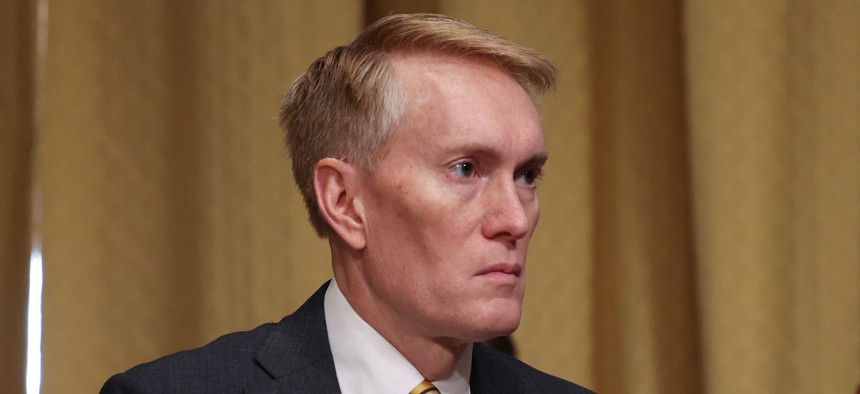
Sen. James Lankford, R-Okla., wants to know the status of OPM's health insurance trust funds in the absence of federal employees' premiums caused by the shutdown. ALEX WROBLEWSKI / AFP / Getty Images
How long will OPM keep paying for feds’ health insurance during the shutdown, a senator asks
Sen. James Lankford, R-Okla., requested details on how the federal HR agency’s plans to fund its health insurance trust funds with federal employees still not being paid during the shutdown.
With the current government shutdown on the precipice of becoming the longest budget stalemate in history, Sen. James Lankford, R-Okla., wants to know how the Office of Personnel Management plans on continuing to pay for federal employees’ health insurance.
In an Oct. 30 letter to OPM Director Scott Kupor, Lankford inquired about the current status of the agency’s health insurance trust funds and what plans are in place to continue insurance coverage once their coffers run dry.
OPM manages multiple trust funds that finance several federal employee health and retirement benefits programs — including the largest employer-sponsored group health insurance program in existence, the Federal Employees Health Benefits program — covering 8.1 million employees, retirees and their eligible family members.
The FEHB Trust Fund pays health insurance premiums to private providers with financing made up from agency contributions for active employees, an annual appropriation for annuitants and survivors and premium contributions from the employees themselves.
But as the current shutdown has now stretched for more than 35 days, federal employees have not been getting paid to contribute to those premiums, and Lankford said he was concerned that the deadlock will soon mean that the workforce could lose its health insurance as well.
“Approximately, 1.4 million federal employees are either working without a paycheck or are furloughed, and their families depend on the Federal Employees Health Benefits (FEHB) program for health insurance coverage. They deserve to know whether that coverage will continue uninterrupted,” Lankford said. “Despite many efforts to reopen the government and pay federal workers, vital agencies remain closed, employees’ paychecks continue to be withheld and now access to healthcare for every federal employee and their families could be threatened.”
According to OPM, estimated outlays for both the FEHB Trust Fund and the Retired Employees Health Benefits Trust Fund in fiscal 2024 were a combined $65.3 billion, up more than 7% from fiscal 2022’s $60.96 billion in outlays, the most recent complete figures.
The budget standstill also comes as the cost federal employees and retirees’ premiums have already risen an average of 12.3% for insurance coverage in 2026. Open season for enrollment in those benefits begins on Nov. 10.
Lankford requested clarification from Kupor on the status of OPM’s contribution trust funds, the date the trust funds will run out of finances and the timeline for notifying insurers.
The senator also requested information on the risks federal employees could face without the insurance funding, how those employees would be held harmless for the lapse in funding and what legal options remain to continue paying insurance contributions when the trust funds run empty.
In an email to Government Executive, an OPM spokesperson said, "This wouldn't even be an issue if Democrats would simply vote to end the government shutdown," and noted that the "Office of Personnel Management has clear procedures in place allowing carriers to request additional funding from contingency reserves when needed, and all Federal Employee Health Benefit plans currently have sufficient funds to pay claims. OPM remains fully committed to ensuring federal employees, annuitants, and their families continue to have uninterrupted access to their health insurance coverage throughout this lapse in appropriations."







